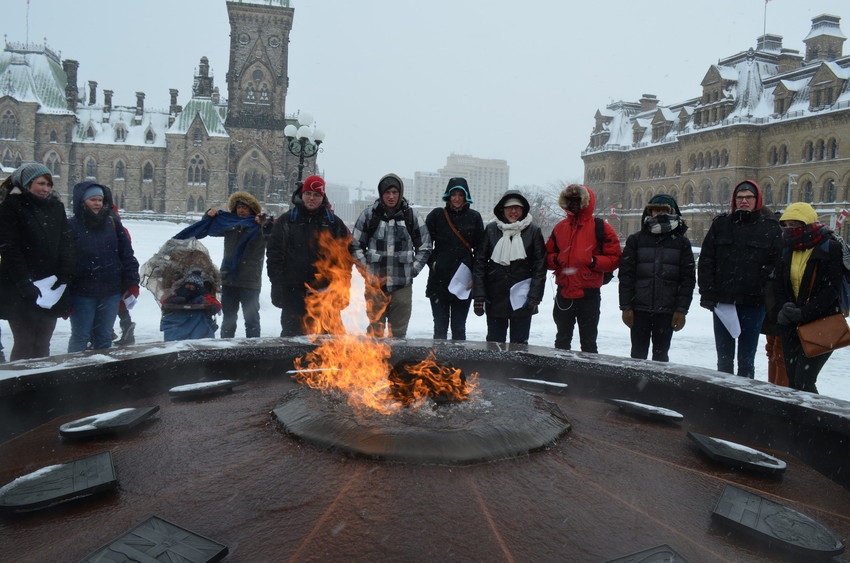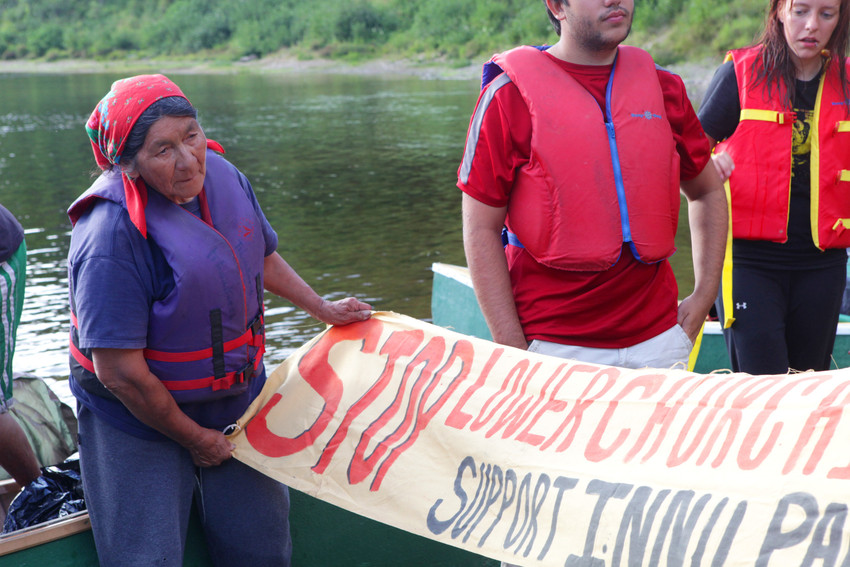Individual articles from the Summer 2020 issue of Intersections will be posted on this blog twice per week. The full issue can be found on MCC’s website.
MCC Canada has a long history of speaking to the Canadian government about militarization and participation in armed activities. Over the years, this advocacy has evolved as relationships with Indigenous nations in Canada have opened the door to new understandings of peace and nonviolence. Yet these new understandings have come with challenges that continue today. MCC advocacy in support of various Indigenous communities of Labrador in protesting against NATO military activities at the end of the Cold War and later against a hydro-electric dam initiative illustrates both challenges and opportunities for MCC’s advocacy in Canada more broadly.

Since the early 1950s, MCC Canada sought meetings with prime ministers to advocate for the rights of conscientious objection and alternative service. Over time, those petitions began to shift focus, moving from requests for the respect of Mennonite religious beliefs to including asks for government actions to reduce international conflict. Speaking to government about matters of conflict and war gradually became a part of MCC’s relief, development and peacebuilding work. This change, along with a recognition that a listening post in Ottawa would further the work of MCC, led to MCC opening its Ottawa Office in 1975.
Over the ensuing years, MCC advocacy became increasingly linked to MCC’s model of accompaniment and community service. As Esther Epp-Tiessen writes in her history of MCC in Canada, MCC service workers living in communities around the world and witnessing firsthand the harm of military action began to increasingly share about the impacts of Canadian policies and military action. These concerns began to form the basis of MCC’s advocacy communications and shape the way MCC understood its dual responsibilities—to its Anabaptist constituent in Canada and to the communities and partners MCC accompanied.
During the final years of the Cold War, MCC Canada undertook advocacy related to the impact of global militarization in Happy Valley-Goose Bay, Labrador. MCC have had an ongoing, long-term presence in Labrador, with work in the province stemming back to the 1970s (and with partnership with Innu communities beginning in 1983). In the 1980s, NATO began testing low-level military flights over Innu traditional territory in Labrador, taking off from and landing at the Canadian military base in Goose Bay. More than 8,000 flights took place each year, harming wildlife and disrupting the Innu community’s traditional way of life. As the Cold War progressed, NATO proposed building a larger, more permanent training base in the area. Despite some hesitation from its governing board, MCC Canada began to highlight the concerns of these Innu communities through advocacy, as part of a larger advocacy campaign against Canada’s participation in NATO in general.
If the Innu are not requesting military defence, and if Mennonites from a Christian peace position are saying the same things, how would it be if we would find a way of making a joint statement between the Innu and Mennonites to that effect?
— Menno Wiebe
For several years, the Ottawa Office had consistently voiced concerns around NATO and Canada’s participation in the Cold War arms race in their correspondence to government. Now, the office began to include Innu voices and experiences in their communications to government officials, connecting advocacy against Canadian militarization with Innu concerns about how NATO flight were upending their traditional way of life. Advocacy against NATO began to include requests to also resolve land claims and to look for shared points of connections between Mennonites and Innu communities, including shared understandings of relationships to the state.
In a 1989 letter to MCC Canada program leaders, Menno Wiebe, director of MCC’s Native Concerns program, asked: “If the Innu are not requesting military defence, and if Mennonites from a Christian peace position are saying the same things, how would it be if we would find a way of making a joint statement between the Innu and Mennonites to that effect?” Wiebe highlighted a meeting between Peter Penashue, an Innu community leader, and five liberal members of parliament, in which the Innu stated that they were not asking Canada to defend them. For Wiebe, the Innu assertion of their sovereign right to refuse being defended by NATO and the Canadian military opened potential fruitful connections to Mennonite concerns about militarization.
MCC’s Ottawa Office raised further concerns about the NATO flights over Innu territory through its partnership with Project Ploughshares. These advocacy initiatives encouraged Canadians to send letters and request meetings with government officials to voice concerns about the NATO flights, arguing that “in the name of ‘security,’ such fighter-bomber flight training is imposing insecurity on the Innu peoples.” Other letters seeking to mobilize advocacy efforts referred to the lack of a just relationship between the Government of Canada and the Innu, calling on the Canadian government to re-examine its commitment to the proposed NATO base.
During this time, the Innu invited Rick and Louise Cober Bauman and their children to live in the more rural community of Sheshatshit, in part based on their increased trust of MCC through MCC’s willingness to advocate. Rick recalls sending faxes encouraging advocacy and providing updates from the local Innu resource centre, connecting Mennonites and many other interested supporters not only in Canada but also in the United States, the Netherlands and Germany. The family living room was the site of planning sessions to block fighter jets from taking off by occupying the runway at the military base. MCC was intimately involved in witnessing the devastations of colonization, the struggle for self-determination and the impacts of Cold War politics on those far removed from the causes of conflict.
With the fall of the Berlin Wall and the ending of the Cold War, flights from and construction on the NATO base stopped. Without the push around direct militarization, Ottawa Office advocacy on the Innu issues declined. The Indigenous communities in Labrador, however, continued to face challenges to their right to live on their land. Structural violence, rather than overt military presence, continued. A hydro-electric dam built at Muskrat Falls and completed in 2019 has posed concerns around land and water contamination.
MCC workers sought to discern how to respond to such ongoing colonization, especially as shifts in approaches among Indigenous communities varied. Overall, the Innu did not oppose the dam, as the project approval was a part of their land claims agreement. The Southern Inuit and Northern Inuit communities downstream from the dam, however, engaged in advocacy over their concerns of methylmercury poisoning, with the support from only a very few members of the Innu community.
MCC workers, up until 2019, engaged actively in responding to these shifting concerns and nuances within the region. They built relationships with land defenders in the Inuit communities opposing the hydro project and actively facilitated community organizing processes. Instead of working with Chief and Council, as they had with the Innu, MCC workers connected with strategic individuals. They worked to bring members of the different communities together, along with working behind the scenes to support public statements and actions. MCC workers intentionally tried to keep a lower profile and focused on raising the voices of individual land defenders, rather than the voice of MCC.
The advocacy component of MCC’s local presence was strong, but public Anabaptist support of advocacy against the hydro project was not the same as with advocacy against the NATO flights, despite heavy RCMP presence at the site to arrest and remove protesters. Other grassroots organizations across Canada and the U.S. advocated against the hydro project, but there was very little Anabaptist outcry. The Ottawa Office was unable to offer much support, due to changing MCC priorities in Canada. Without the direct connections to militarization, there was no longer the same tangible draw for Mennonites or peace activists.
Rick Cober Bauman reflects that “mines and dams didn’t have the same impact as women running in front of jets. We may believe we can live without defense, but can we live without nickel or hydro? Things got more complex.” This complexity was seen not only in lack of Canadian Anabaptist support for advocacy against the hydro project, but also in the important nuances MCC workers navigated each day, as they responded to the different concerns and relationships they had built, relationships that included the different perspectives of multiple Indigenous groups, nuances that were easy to overlook when only focusing on a response to overt militarization or communicating a more simple story about MCC’s presence.

This history is relevant today as the Ottawa Office has been mandated to look for opportunities to engage in MCC advocacy around Indigenous justice, as MCC seeks to come to terms with its historical identity as an organization founded and supported by Canadian Mennonite settlers on Indigenous land. How do we understand and respond to state violence, such as colonization manifested as control over territory, when it isn’t obviously militarized? Can we use the language of state violence and our complicity to engage with constituents, in a way that engages on a national level, including in regions where extractive and mega-projects are major employers of MCC supporters? Additionally, MCC no longer has workers living with and directly supporting Indigenous communities in Canada, making it more difficult for us to “hear” Indigenous voices, including their diversity and nuances, in the ways that have traditionally shaped our advocacy work. How do we understand and portray nuance, without holding those active relationships? Addressing structural and colonial violence in Canada, reflecting on our own participation in that violence and then engaging in advocacy for Indigenous rights in Canada should be vital elements of MCC’s evolving peace advocacy, even as MCC faces multiple challenges in doing so.
Anna Vogt is director of MCC’s Ottawa Office.
Brody, Hugh. The Other Side of Eden: Hunters, Farmers and the Shaping of the World. New York: North Point Press, 2002.
Heinrichs, Steve. Ed. From Wrongs to Rights: How Churches Can Engage the United Nations Declaration on the Rights of Indigenous Peoples. Winnipeg: Mennonite Church Canada, 2016.
